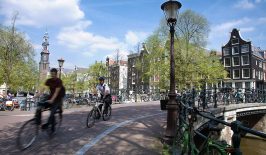When the London borough of Westminster spent £6 million on a smart centralised system for its 14,000 street lights, it could hardly have expected insolvency to leave it stuck with the lights on.
Since December 2018, close to 30 per cent of all of the City of Westminster’s street lights (around 8000 or so) have been blazing away, day and night, 24 hours a day. The lights couldn’t be switched off because the manufacturer of the wireless control system, Harvard Technology, had gone into administration in December. The council was ultimately forced to hire a specialist set of engineers to fix the system and finally switch the lights off (and back on when required) some three months after the insolvency.
This situation might lead for some to harken back to the good old days of dumb street lights. Indeed, the lamplighters of gas lamps of yore are probably rubbing their hands together, waiting for London to go back to a more simple time.
The facts are, though, that Westminster was tracking yearly savings of 1.5 million kilograms of carbon and £420,000 per year, (based on energy prices in 2013) before the insolvency threw a spanner in the works. And they were predicting that the system was to run for another 20 years, and save a projected £8.4 million over the 20-year lifespan of the lights.
The argument is simple: if smart cities and the Internet of Things are to really prosper, a vendor’s financial status shouldn’t impact the lives of residents and citizens, nor should it result in wasted energy and needless emissions being emitted. Yet getting firms, especially large multinationals, to agree on using anything but in-house technology, is not easy.
It can be done, though. Well regarded, well operated open source projects have gravity, and slash development times while improving overall security. Michael Shalyt, CEO of the infrastructure security startup Aperio Systems, believes that it’s only a matter of time once open source projects reach a critical usefulness: “Once an open source project seems good enough and it’s free, there is a lot of pressure to use it, simply to shorten the development cycle, saving time and money.”
So where are the open source solutions at?
Open source solutions for smart cities do already exist, with a number of companies working towards open source smart technologies, devices, data storage and platforms. One alliance of companies across smart city, smart energy and IoT network sectors is the uCIFI Alliance, an open source communications platform based in the US. Another open source communications network player is the MXC Foundation, a non-profit based in Berlin, which recently signed with Shanghai to deploy LPWAN hardware and its open source IoT standard in the city. Meanwhile, Siemens and Toshiba back the Linux Foundation’s Civil Infrastructure Platform (CIP) as a framework, or software building blocks in civil infrastructure projects.
The list is long: it’s clear that the winners are still emerging in this sector. But the situation facing Westminster may bring some clarity to decision makers in other cities. The most sustainable solution that can bring benefit to our cities, and in turn, benefit the economy and reduce carbon emissions doesn’t look, from here, to be anything other than open source. And in the long run, cities supporting those projects will be the ones that are better off.






